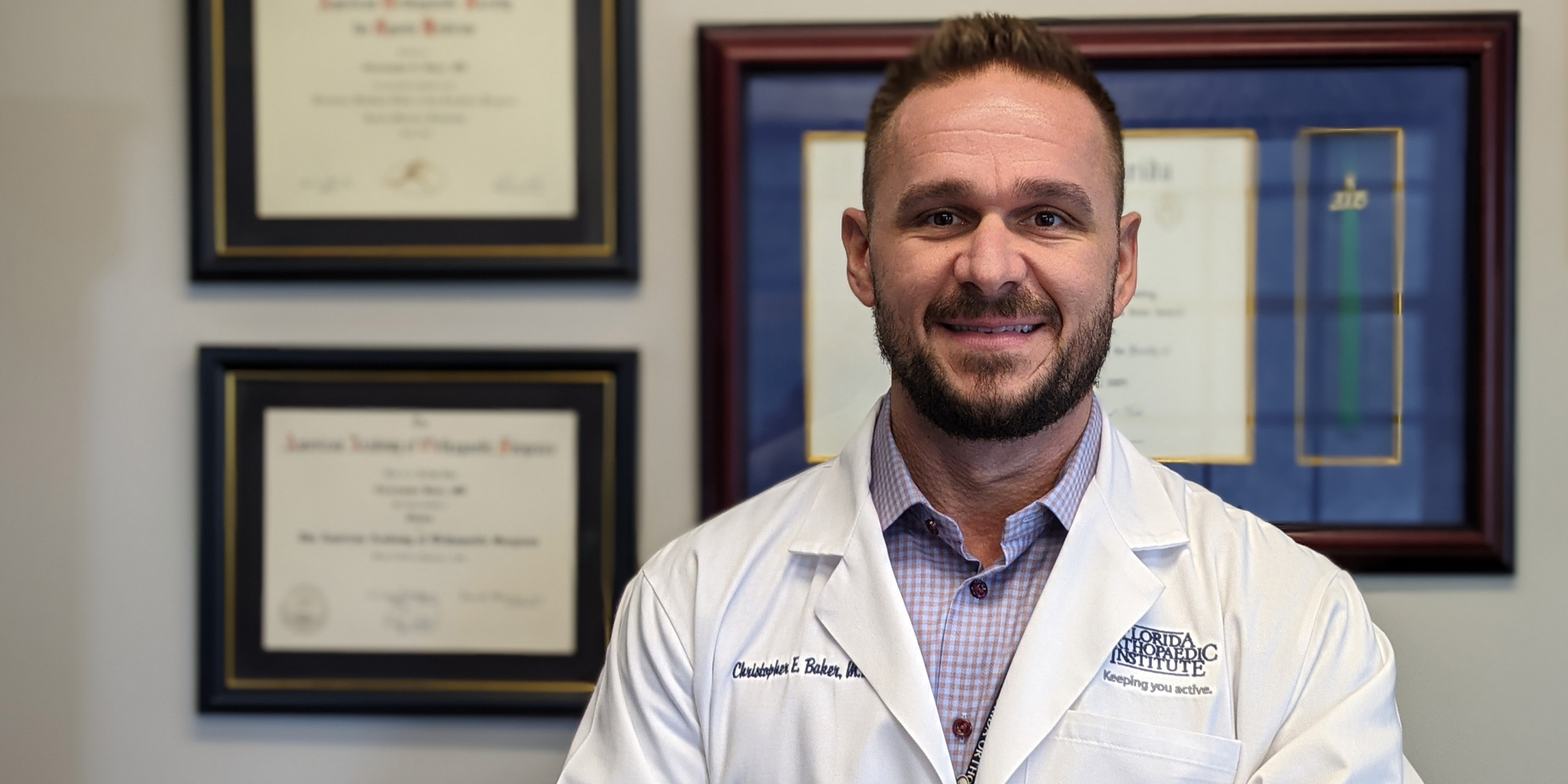Brought to you by Dr. Christopher Baker, Orthopedic Surgeon at Florida Orthopaedic Institute
According to the National Institute on Drug Abuse, research shows nearly 70% of drug overdose deaths in Florida involved opioids in 2018. Although there has been a push to avoid excessive prescribing of these addictive drugs, Florida providers still wrote 53.7 opioid prescriptions for every 100 persons in 2018. Historically, it was common practice to prescribe opioids after surgery; however, even if taken as directed, they can often leave patients with side effects such as constipation, dizziness, vomiting, and the risk for addiction or dependence. Fortunately, there are non-opioid options available to help patients safely and effectively manage pain after surgery.
As an orthopedic surgeon practicing at Florida Orthopaedic Institute, I am a strong advocate for patient education and aim to ensure that I provide the best possible care and recovery experience for my patients. While it’s widely known that orthopedic surgeons are among the top prescribers of opioids among U.S. physicians, an established body of research demonstrates that minimizing opioid use before, during, and after total shoulder replacements may help curtail overuse and dependence. That fact alone made implementing non-opioid options into my practice an effortless decision. After learning about a non-opioid option called EXPAREL® (bupivacaine liposome injectable suspension), I quickly incorporated it into my pain management protocol, along with various other non-opioid techniques, to safely and effectively manage patients’ postsurgical pain while minimizing the use of opioids.
EXPAREL is a long-acting local anesthetic that is injected by your doctor during the procedure to help relieve pain for the first few days following surgery, when its often at its worst. EXPAREL slowly delivers a numbing medication into your body and helps patients get through this crucial recovery window.
Opioid prescriptions have been significantly reduced or, in some cases, eliminated in my practice since incorporating non-opioids. Further, nearly 100% of my shoulder surgeries are same-day procedures – never requiring an overnight stay for my patients. In comparison, I have found that patients who do not receive EXPAREL have a completely different recovery experience.
As a healthcare provider and advocate, I encourage patients to speak with their doctor about the best pain management plan for them and to learn about the non-opioid options available, especially for postsurgical pain. It is my belief, and the research validates, that non-opioids can provide an enhanced recovery experience. As the opioid epidemic continues to rage on, it’s time we make a change and take a deeper look at how we manage pain.
For more information, please visit www.EXPAREL.com/safety.
About Florida Orthopedic Institute
Florida Orthopaedic Institute’s specialties include Foot and Ankle, Hand and Wrist, Joint Arthroplasty, Oncology, Orthopaedic Trauma, Pain Management, Rehabilitative Medicine, Shoulder and Elbow, Spine Surgery, Sports Medicine, Chiropractic Services and Physical and Occupational Therapy. The practice has 10 locations throughout the Tampa Bay area.
813-978-9797


This article is sponsored by Pacira BioSciences, Inc. and Florida Orthopaedic Institute.
Indication
EXPAREL® (bupivacaine liposome injectable suspension) is indicated for single-dose infiltration in patients aged 6 years and older to produce postsurgical local analgesia and in adults as an interscalene brachial plexus nerve block to produce postsurgical regional analgesia. Safety and efficacy have not been established in other nerve blocks.
Important Safety Information
EXPAREL should not be used in obstetrical paracervical block anesthesia.
In studies in adults where EXPAREL was injected into a wound, the most common side effects were nausea, constipation, and vomiting.
In studies in adults where EXPAREL was injected near a nerve, the most common side effects were nausea, fever, and constipation.
In the study where EXPAREL was given to children, the most common side effects were nausea, vomiting, constipation, low blood pressure, low number of red blood cells, muscle twitching, blurred vision, itching, and rapid heartbeat.
EXPAREL can cause a temporary loss of feeling and/or loss of muscle movement. How much and how long the loss of feeling and/or muscle movement depends on where and how much of EXPAREL was injected and may last for up to 5 days.
EXPAREL is not recommended to be used in patients younger than 6 years old for injection into the wound, for patients younger than 18 years old for injection near a nerve, and/or in pregnant women.
Tell your health care provider if you or your child has liver disease, since this may affect how the active ingredient (bupivacaine) in EXPAREL is eliminated from the body.
EXPAREL should not be injected into the spine, joints, or veins.
The active ingredient in EXPAREL can affect the nervous system and the cardiovascular system; may cause an allergic reaction; may cause damage if injected into the joints; and can cause a rare blood disorder.
PP-EX-US-6992



